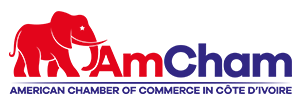Services
Access USA
The U.S. Market
- United States Export $3,5 Trillion
- United states import $4,88 Trillion
- D.P per capita $57.5 k
- Top Imports: cars ($177B), Petroleum ($104B), computers ($88.6B) and Medicaments($74.4B)
U.S. – Cote d’Ivoire Trade Facts
- CIV is 85th largest goods trading partner to the US
- Goods trade $1.6 Billion
- Goods export $309 million
- Goods import 1.2 Billion

Exports & Imports
U.S.-CIV Trade
CIV Mission
VISAS
Exports
- U.S. goods exports to Cote d'Ivoire $309 million
- Down 3.9% ($13 million) from 2017 but
- Up 21.8% from 2008.
- The top export categories:
- mineral fuels ($67 million),
- plastics ($52 million)
- organic chemicals ($45 million)
- machinery ($31 million)
- vehicles ($16 million).
- Agricultural exports $24 million
- Leading domestic export categories : rice ($10 million), condiments & sauces ($9 million), processed vegetables ($1 million), beef & beef products ($1 million), and prepared food ($1 million).
Imports
Totaled imports from Cote d'Ivoire - $1.2 billion (the top import categories):- Cocoa ($734 million),
- Mineral fuels ($372 million),
- Rubber ($92 million)
- Edible fruit & nuts (coconut, brazil, cashews) ($24 million)
- Wood and wood products ($7 million).
- Cocoa beans ($608 million),
- Cocoa paste & cocoa butter ($113 million)
- Rubber & allied products ($92 million)
- Tree nuts ($24 million)
- Snack foods ($13 million).
